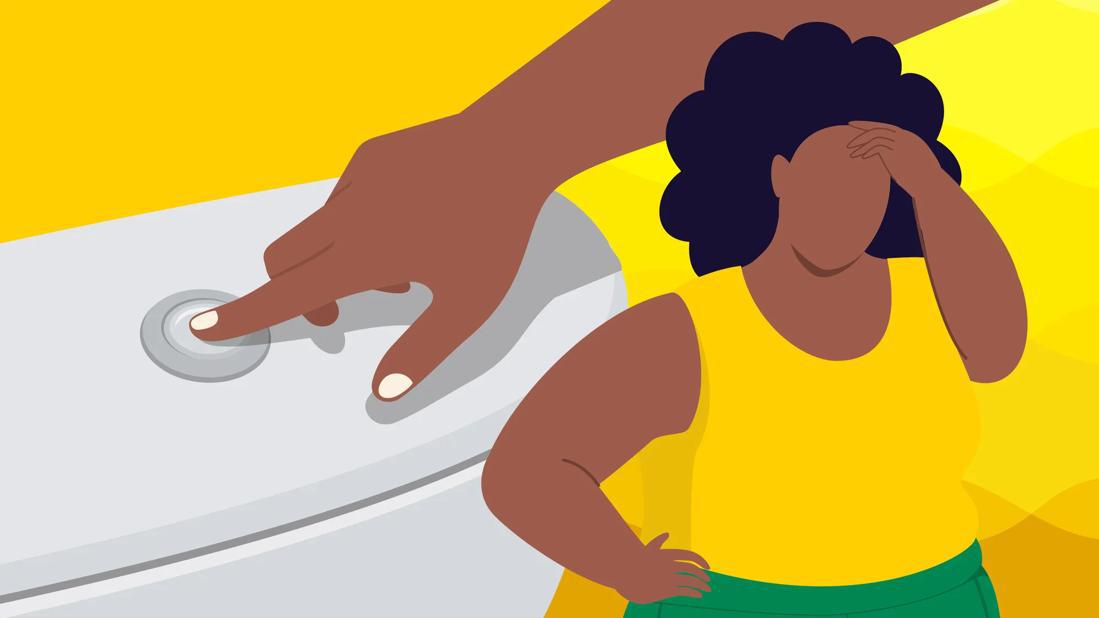4 Things That Cause Yellow Diarrhea
Stomach bugs, foods and excess bile or fats can cause yellow diarrhea

Diarrhea is an unpleasant experience that has multiple causes. Loose, watery stools now and then are fairly common. But should you be concerned if you see yellow diarrhea?
Probably not, says Bryn DeSantis, CNP, a certified nurse practitioner specializing in digestive disorders.
“It’s normal for stool to be different colors on occasion,” she notes. “Most of the time, yellow diarrhea is harmless.”
To help calm your queasy tummy, DeSantis explains common causes and treatments for yellow diarrhea.
Why is my diarrhea yellow?
Most of us expect poop to be brown. But stool color, shape and even smell can change from day to day. Loose, watery stools, or diarrhea, can also be different colors. So, what does yellow diarrhea mean? DeSantis shares the most common culprits behind that yellow color.
1. You don’t have a gallbladder
Poop color is usually a mix of brown, yellow and orange. The yellow and orange colors come from bile and bilirubin.
Your gallbladder stores and releases bile (made by your liver) in small amounts when you eat. This fluid helps break down fats and absorb nutrients. Bile gets its yellow color from bilirubin, a waste product that occurs when red blood cells naturally break down.
If you had surgery to remove your gallbladder, the bile goes directly from your liver to your intestines all at once. Bile acid malabsorption occurs when your intestines can’t absorb the excess bile. Acids in the bile cause your intestines to release more water. The extra water causes diarrhea, while the extra bile makes the loose stools yellow.
“It’s normal to have yellow diarrhea after gallbladder removal as your body readjusts to managing the bile,” says DeSantis.
For some people, bile-induced yellow diarrhea becomes a persistent problem. Cutting back on food high in fat, as well as making other dietary changes, can help.
“The more fat you consume, the more bile you’ll have in your stools, and the greater the chance for persistent diarrhea,” she adds.
2. Your body can’t absorb fatty foods
Excess fat in your foods, or conditions that affect your body’s ability to break down and absorb fats, can cause yellow, fatty stool known as steatorrhea. This stool often floats and may look loose or greasy.
Several conditions cause steatorrhea, including:
- Exocrine pancreatic insufficiency (EPI)
- Celiac disease
- Crohn’s disease
- Pancreatitis
- Liver disease
- Pancreatic, liver or bile duct cancer
If you’re diagnosed with one of these conditions, taking prescribed medications or eating diets recommended by healthcare providers can help to normalize stool appearance.
3. You have a stomach bug
Stomach bugs are conditions that cause diarrhea, vomiting and other upset stomach symptoms. Diarrhea from these infections can appear yellow when your body doesn’t have time to absorb the bile in the stool, given the increased speed of your intestines.
Common causes include:
- Viruses, such as norovirus and rotavirus (commonly called the “stomach flu”)
- Bacterial infections, like Salmonella and E. coli
You may want to stick to soft, bland foods, such as bananas, rice, applesauce and toast, which are part of the BRAT diet, until your bowels feel better.
4. You’ve consumed yellow foods or supplements
The foods you eat can affect stool color. Carrots, sweet potatoes, squash and other orange-yellow foods high in beta-carotene can make stool yellow. The same is true for yellow-colored spices like turmeric and turmeric supplements.
Natural pigments called carotenoids give these foods their yellow hue. These foods are unlikely to cause diarrhea — unless you eat a lot of them in one sitting. Still, they may temporarily color your stool yellow.
Remedies to stop yellow diarrhea
Yellow diarrhea that starts suddenly and goes away in a few days is rarely cause for concern. To help get things back on track, you can:
- Cut back on high-fat foods and dairy products.
- Follow the BRAT diet or try diets to help calm diarrhea.
- Drink plenty of water or electrolyte drinks to prevent dehydration.
- Try an over-the-counter antidiarrheal medication for fast relief or probiotics for improved gut health.
- Avoid alcohol and caffeinated beverages like coffee, which act as laxatives.
When to see a provider
See a healthcare provider if you have persistent diarrhea (of any color) that lasts for more than a week.
“Persistent bouts of yellow diarrhea can be a sign of malabsorption or a gastrointestinal disorder that requires a medical diagnosis and treatment,” says DeSantis. “Your healthcare provider can help get to the bottom of the issue and get you the treatment you need.”